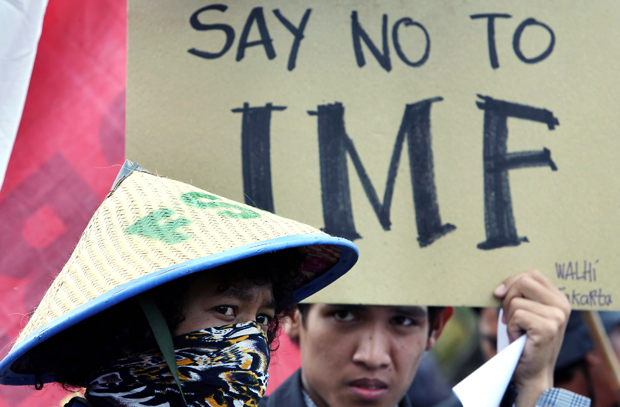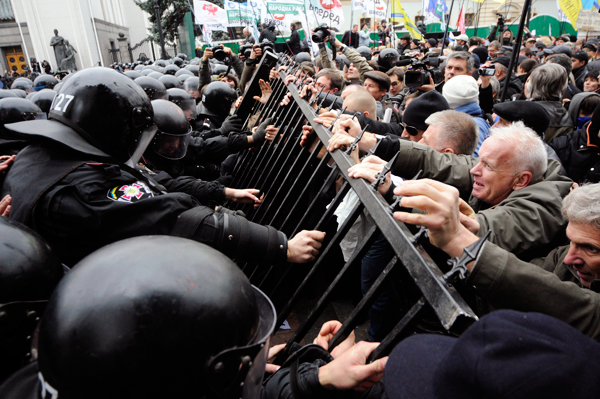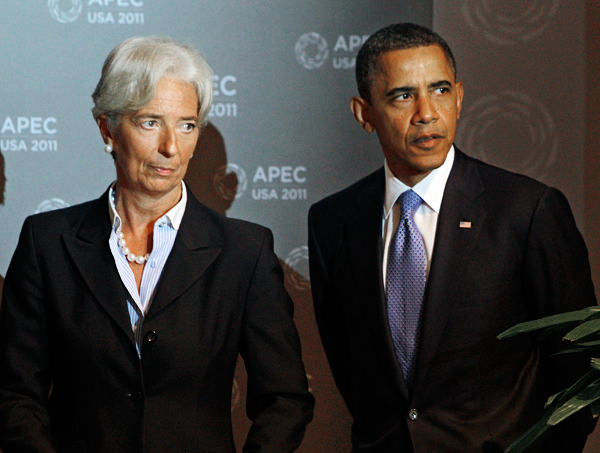Новости – Digest












Digest
Anniversary of IMF: A Story of Economic Undertaker

Photo by: Jewel Samad / AFP
Chronicle of IMF crimes
29 декабря, 2015 16:00
7 мин
On December 27, 1945 thirty nine states were the first to sign the Charter of International Monetary Fund. Thus, the major legacy of the Bretton-Woods system turned 70 years old. Now, it is time to review the results of its multifaceted and intense activity.
Initially, the purpose of IMF was to merely provide for global financial stability and coordinate monetary policies of its member states. The organization was designed as a global mutual aid society which would accumulate international financial experience, consult heads of state on budget solutions and issue short-term loans for economic assistance in trying times. This concept was first implemented in 1947 when European post-war economy was revived with US loans, which became known as the Marshall Plan.
Despite its ambitious name, the equity of the fund accounted for no more than $7,7 bn. (in 1990 prices). Compared with the total GDP of the Allies coalition ($2 trillion without USSR), it was pretty humble. From 1947, when IMF issued its first loan for France, till 1966 the organization had been doing what it was meant to, that is financing economies of member states. The majority of them were developed countries which received two thirds of all loans; of them, Great Britain got 41,5%. Then, everything changed.
How a loyal servant became an evil master
In the period from 1947 to 1966, IMF issued loans totaling 9,4 billion SDR (Special Drawing Rights, 1 SDR equals 1 British pound approx.). Throughout the next decade (1967-1976), this sum grew as much as 19,6 billion SDR. Ten years later the result was 51,6 billion, and at the end of 1996 it was 58.2 billion. This whole time, the political influence of the fund had been increasing. In 1947, the Charter was signed by 37 states, and in 1966, Guyana became its 109th member. This is where and when quality was replaced with quantity.
The primary reason for that was introduction of Special Drawing Rights, the organization’s own currency. The creators of IMF instilled into its structure a hidden catch that was revealed much later, if not too late. In the beginning, SDR was a conventional unit with gold content 0,888671 grams, which was equal to the gold content of the American dollar. Then, however, there was one devaluation after another, until the dollar was no longer bound to gold. From July 1, 1974 the value of SDR has been determined by the average value of the currency basket which initially included 16 major currencies, but now includes only four. They are US dollar (41,9%), euro (37,4%), Japanese yen (9,4%) and British pound (11,3%). They are officially called reserve currencies.
Every member state of IMF has a quota in the authorized capital that depends on the volume of its economy. The state is obliged to fulfill this quota observing a certain ratio: a quarter in reserve currency and three quarters in national currency. Thus, joining the global ‘financial club’ implies acquisition of reserve currency. Moreover, loans are issued in SDR which can be exchanged at the fund’s internal rate for the currency the recipient needs. This mechanism quickly raised the importance of the reserve currencies, making them an essential legal tender on the international scale.
The second reason behind the ascension of IMF was a management method that has allowed the fund to operate sums bigger than its own assets. Enjoying the figurative status of “UN’s wallet”, IMF in 1960s began to play the role of an intermediate for private investors. The fund had no official obligations, but it was an unspoken rule that if IMF’s experts examined the financial balance of some country and agreed upon issuing a loan, then it is totally safe to invest money in its economy. Private investments grew three, five and many more times as much as IMF’s loans. For independent investors, it was more expensive to operate in other countries than for those who earned the support of IMF.
As result, 187 states (98% of UN membership) had joined IMF by 2012. The total authorized capital of the organization had allowed it to issue more than 187,1 SDR ($255 bn.) in loans. The vector of the credit policy also changed. Before 1966, loans were issued to developed countries. Since 1987, IMF has only financed developing ones. The sole exclusion from this tendency was the period of the collapse of the Soviet Union, when EU began its Eastern European expansion.
Beware of Greeks bearing credits
The post-war restoration of Western European countries remains the lone success story of the fund, accordingly to goals and objectives declared in its Charter. Every other time IMF has offered its money and services, it’s left nothing but ashes.
At first glance, there is nothing wrong or evil in the policy of this organization. IMF’s experts deeply understand the laws of global economy thanks to the giant database of facts and statistics. IMF is ready to provide assistance to any country in dire need of money; the fund does not issue commercial loans but it can finance the structural modernization of any economic policy. However, conditions are always the same: the recipient is obliged to restore its solvency as soon as possible. If the state cannot increase its incomes, it must cut its expenses.
For any government, reduction of expenses basically means refusal to subsidize domestic economy, limitation of social benefits and opening of borders for foreign capital. Additionally, it implies privatization of public property, making preferences for private investors and, of course, higher taxes. The annual reports show a beautiful picture of international society helping its neighbor, but in reality, it always ends with the predator devouring its prey.
1980. IMF issues a $150 million loan for Somali. Observing the fund’s recommendations leads to collapse of economy. In 1987, the government becomes unable to make regular payments. A civil war breaks. In 1990, rebels capture the capital city of Mogadishu, and Somali ceases to exist as a solid state. On its territory, the conflict still rages.
1982. Sudan receives $260 million from IMF for structural reforms. By 1986, its economy has crumbled to pieces. The fund deprives Sudan of the right to receive loans, and later, in 1993, of the right to vote. Only seven years later, the government manages to reach agreement with IMF but by that time, the debt has grown as large as $1.5 billion. Sudan continues to pay this debt even after the separation of Southern Sudan.
1982. Mexico’s economic system is a working model of state capitalism done right. However, fall of oil prices leads to financial crisis, and IMF imposes on Mexico so-called “Baker plan”, reinforcing it with a $3,4 billion loan. Implementation of this plan bankrupts the country and lets the fund assume control over Mexico’s finances. The flight of capital to USA amounts to $45 billion. People flee away from the country. Today, the most of its territory is governed by drug lords.
1989. The government of Yugoslavia initiates a series of radical reforms after the recommendations of IMF. One of the fund’s requirements is to reduce subsidies for economically disadvantaged regions. This leads to decrease in standards of living, increase in unemployment and, finally, to a civil war and intervention of NATO. As result, Yugoslavia is erased from the political map of the world.
1989. Rwanda’s relatively stable agricultural economy is suffering from a two years long draught. Rwanda applies to IMF for a loan, counting to repay it with a promising harvest of coffee. The fund’s requirements are cancellation of government support for farms and devaluation of national currency. What it ends with is a civil war that has claimed over two million lives.

Street protests in Ukraine. Photo by: Sergei Chuzavkov / AP
The most recent example is Ukraine. For the last two years, the volume of the country’s foreign debt has tripled, totaling $47,4 billion. Of this quantity, IMF’s part is $16,6 bn., while $17,78 bn. were received from the private fund Franklin Templeton which is supported by IMF.
IMF and the Great Recession
Strictly speaking, “investment activity” in IMF style revealed its strategic flaws back in 1997 when Asian financial crisis hit (and echoed in Russia as 1998’s default). Asian countries accepted IMF’s recommendations, which resulted in deep arrears and overbought national currencies. IMF pumped the region’s economies with loans to prevent devaluation. Devaluation was only slightly delayed, while its implications were considerably worsened.
Asian governments were blamed for that fail because almost everyone in the world believed in IMF and trusted its recommendations. The capital of the fund arrived at $750 billion. However, in the beginning of 2000s, so-called “dot-com collapse” compromised reputation of the fund. In 2001 and 2002, the total volume of loans accounted for 14 and 40 billion SDR respectively. By 2005, it had dropped as low as 3 billion SDR.
There was simply no one left to rob. Countries which had sufficient economic might (including Russia) would pay their debts as soon as they could to never again take money from IMF. Up until 2008, the volume of issued loans had remained lower than in 2005. The major part of the fund’s capital got stuck in countries too troubled to return the money. There was only $250 billion left to operate with.
The Great Recession of 2008 was a salvation for IMF, despite being a disaster for some governments and for global economy. Honestly speaking, greater members of the fund saw different opportunities and pursued different interests in that situation.
For example, USA tried to invest in IMF more than $500 billion and provide “emergency assistance” for Southern and Eastern European countries. In 2009, the total of issued loans was over 60 billion SDR, in 2010 – over 75 billion. The “main beneficiary” did not even hide the criminal nature of its actions. In 2009, every SDR was a “crisis” one, meant to patch up gaping holes in economies. A year later, the ratio was 2/3. In 2011, of 145 billion SDR 75% were “means of emergency”. In 2012, it was almost 100% of 52 billion. In 2013, all 80 billion SDR also went for “extraordinary measures”.
Judging by the fact that only 30 billion SDR were issued in 2014, IMF has run out of money. There have been “success stories”: for instance, Greece is now one big auction house. However, this is rather an exception than a rule. Even Ukraine, where economic default is expected to hit on December 30, 2015, cannot be sold out for a number of obvious political reasons. The most important thing about it all is that financial environment has considerably changed for the last 15 years.
USA is parted from the common wallet
When IMF was established in 1947, its member states were mighty economies with aggregate GDP half that of the whole world’s. Financially, USA, Great Britain and France weighed as much as other seventy countries combined. Financial intervention into any of them would not require much from the authorized capital of the fund.
Today, everything is different. The total GDP of BRICS (using PPP exchange rates) is almost equal to the collective economic might of USA and European Union. In spite of the crisis and game of sanctions, Russian foreign-exchange reserves account for $374 billion (as of October 9, 2015), which exceeds the authorized capital of IMF by one and half times.
China has been attempting to include yuan in the reserve currency basket for long time, but could not succeed as USA remained in control over IMF. But as soon as leaders of the European Union realized that its GDP surpassed American GDP, a hidden strife for redistribution of leading positions started. In May, 2011 a sexual harassment case was concocted against the former head of IMF. By now, it has stalled in court, but Dominique Strauss-Kahn already lost his status. The new head of IMF Christine Lagarde has recently, all of a sudden, been accused of corruption and negligence. The confrontation is clearly far from finale.

Christine Lagarde and Barack Obama. Photo by: Andres Leighton / AP
Annual revision of IMF members’ quotas is due at the beginning of 2016. It will redistribute votes, according to which countries can influence the decisions of the fund. The current fraction of USA is 17%, which allows it to veto any decision. Washington has been hindering the revision of its quota for five years. Inclusion of yuan in the basket of reserve currencies signifies that Americans have run out of political opportunities for domination. We have every evidence that great changes will happen in a matter of weeks. We should not, however, hurry to exclude USA from this complex equation.
Truth be told, their control is not likely to last. In the new financial reality, there are alternative international lending agencies that are designed not to rob but to help. They are the Asian Infrastructure Investment Bank, BRICS Development Bank and EURASEC Anti-crisis fund. The epoch of IMF is approaching its end. Seventy is really a senile age. It’s time to go…
поддержать проект
Подпишитесь на «Русскую Планету» в Яндекс.Новостях

Яндекс.Новости



















